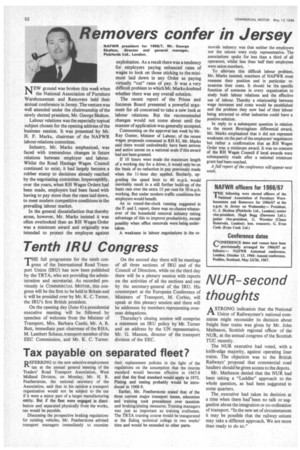Removers confer in Jersey
Page 54

If you've noticed an error in this article please click here to report it so we can fix it.
NAFWR president for 1966/7, Mr. George Skelton, director and general manager, Pickfords Ltd., London.
NEW ground was broken this week when the National Association of Furniture Warehousemen and Removers held their annual conference in Jersey. The venture was well attended under the chairmanship of the newly elected president, Mr. George Skelton.
Labour relations was the especially topical subject chosen for the opening address of the business session. It was presented by Mr. H. F. Marks, chairman of the NAFWR labour relations committee.
Industry, Mr. Marks emphasized, was faced with tremendous changes in future relations between employer and labour. Whilst the Road Haulage Wages Council continued to exist, it had largely become a rubber stamp to decisions already reached by the negotiating committee. Imperceptibly, over the years, when RH Wages Orders had been made, employers had been faced with having to pay more than the rates laid down, to meet modern competitive conditions in the prevailing labour market.
In the general dissatisfaction that thereby arose, however, Mr. Marks insisted it was often overlooked than an RH Wages Order was a minimum award and originally was intended to protect the employee against exploitation. As a result there was a tendency for employers paying enhanced rates of wages to look on those sticking to the minimum laid down in any Order as paying virtually "cut" rates of pay. It was a very difficult problem to which Mr. Marks doubted whether there was any overall solution.
The recent report of the Prices and Incomes Board presented a powerful argument for all concerned to take a new look at labour relations. But the recommended changes would not come about until the manner of application was generally accepted.
Commenting on the approval last week by Mr. Ray Gunter, Minister of Labour, of the recent wages proposals contained in RH 83, Mr. Marks said there would undoubtedly have been serious and active unrest on a national scale if this award had not been granted.
If 10 hours were made the maximum length of a working day for a driver, it would only be on the basis of no reduction in pay previously made when the 11-hour day applied. Similarly, upgrading the speed limit to 40 m.p.h. would inevitably result in a still further build-up of the basic rate over the extra 15 per cent for 30 m.p.h. working. But under modern traffic conditions few employers would benefit.
As to round-the-clock running suggested in the P. and I. report, there was no chance whatsoever of the household removal industry taking advantage of this to improve productivity, except possibly when office removals were being undertaken.
A weakness in labour negotiations in the re movals industry was that neither the employers nor the unions were truly representative. The associations spoke for less than a third of all operators, whilst less than half their employees were union members. • To alleviate this difficult labour problem, Mr. Marks insisted, members of NAFWR must reassess their position and in particular reexamine their costs. It should be the specific function of someone in every organization to study both labour relations and the effective use of labour. Thereby a relationship between wage increases and costs would be established and the problem they now had of their labour being attracted to other industries could have a positive solution.
In reply to a subsequent question in relation to the recent Birmingham differential award, Mr. Marks emphasized that it did not represent weakness on the part of the employers' negotiators but rather a confirmation that an RH Wages Order was a minimum award. It was no concern of the RH Wages Council if local awards were subsequently made after a national minimum grant had been reached.
A full report of the conference will appear next week.




















































































































































